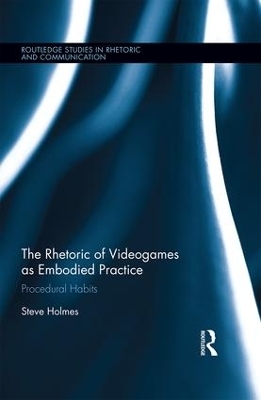
The Rhetoric of Videogames as Embodied Practice
Procedural Habits
Seiten
2017
Routledge (Verlag)
978-1-138-30327-0 (ISBN)
Routledge (Verlag)
978-1-138-30327-0 (ISBN)
This book offers a critical reassessment of embodiment and materiality in rhetorical considerations of videogames.
The Rhetoric of Videogames as Embodied Practice offers a critical reassessment of embodiment and materiality in rhetorical considerations of videogames. Holmes argues that rhetorical and philosophical conceptions of "habit" offer a critical resource for describing the interplay between thinking (writing and rhetoric) and embodiment. The book demonstrates how Aristotle's understanding of character (ethos), habit (hexis), and nature (phusis) can productively connect rhetoric to what Holmes calls "procedural habits": the ways in which rhetoric emerges from its interactions with the dynamic accumulation of conscious and nonconscious embodied experiences that consequently give rise to meaning, procedural subjectivity, control, and communicative agency both in digital game design discourse and the activity of play.
The Rhetoric of Videogames as Embodied Practice offers a critical reassessment of embodiment and materiality in rhetorical considerations of videogames. Holmes argues that rhetorical and philosophical conceptions of "habit" offer a critical resource for describing the interplay between thinking (writing and rhetoric) and embodiment. The book demonstrates how Aristotle's understanding of character (ethos), habit (hexis), and nature (phusis) can productively connect rhetoric to what Holmes calls "procedural habits": the ways in which rhetoric emerges from its interactions with the dynamic accumulation of conscious and nonconscious embodied experiences that consequently give rise to meaning, procedural subjectivity, control, and communicative agency both in digital game design discourse and the activity of play.
Steve Holmes is Assistant Professor of English at George Mason University, USA
Introduction
Part I: Theorizing Procedural Habits
1. Persuasive Technologies in the Rhetoric of Videogames
2. From Persuasive Technologies to Procedural Habits
Part II: Thinking Persuasive Technologies Differently
3. Affective Design and the Captivation of Memory in First-Person Shooter
Videogames
4. Gamification and Suggestion Technologies (Kairos) Beyond Critique
5. Achieving Eudaimonia in Free-to-Play Social Media Games
6. The Habits of Highly Unsuccessful Nonhuman Computational Actors
7. The Materiality of Play as Public Rhetoric Pedagogy
Conclusion
| Erscheinungsdatum | 23.11.2017 |
|---|---|
| Reihe/Serie | Routledge Studies in Rhetoric and Communication |
| Zusatzinfo | 28 Halftones, black and white; 28 Illustrations, black and white |
| Verlagsort | London |
| Sprache | englisch |
| Maße | 152 x 229 mm |
| Gewicht | 521 g |
| Themenwelt | Schulbuch / Wörterbuch ► Wörterbuch / Fremdsprachen |
| Geisteswissenschaften ► Geschichte | |
| Geisteswissenschaften ► Sprach- / Literaturwissenschaft ► Literaturwissenschaft | |
| Geisteswissenschaften ► Sprach- / Literaturwissenschaft ► Sprachwissenschaft | |
| Informatik ► Weitere Themen ► Computerspiele | |
| Sozialwissenschaften ► Kommunikation / Medien ► Kommunikationswissenschaft | |
| Sozialwissenschaften ► Kommunikation / Medien ► Medienwissenschaft | |
| ISBN-10 | 1-138-30327-5 / 1138303275 |
| ISBN-13 | 978-1-138-30327-0 / 9781138303270 |
| Zustand | Neuware |
| Informationen gemäß Produktsicherheitsverordnung (GPSR) | |
| Haben Sie eine Frage zum Produkt? |
Mehr entdecken
aus dem Bereich
aus dem Bereich
Ein offizielles Minecraft-Handbuch
Buch | Hardcover (2022)
SchneiderBuch (Verlag)
CHF 19,90
Über 20 exklusive Bauanleitungen
Buch | Hardcover (2023)
SchneiderBuch (Verlag)
CHF 18,90


